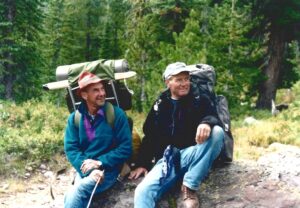
Hank Goetz discovered his love for the outdoors at an early age. He has fond memories of spending summers on his grandpa’s family farm in Wisconsin and traveling West to Montana for camping trips. After spending one year at the University of Wisconsin, Hank transferred to the University of Montana to complete his bachelor’s degree in forest management in 1963. With news of the impending Vietnam war draft, Hank chose to join the Army in the Infantry Officer Candidate program. After spending three years serving, including one year in Vietnam, Hank returned to Montana to work for the Northern Pacific Railroad’s forestry department in Seeley Lake. In 1969, he was offered a promotion involving a transfer to Seattle, but Hank could not imagine a life away from Montana or Idaho. Luckily, at the same time he was offered and accepted a job as the first resident manager of the Lubrecht Experimental Forest by Dean Arnold “Arnie” Bolle of UM’s School of Forestry. While at UM Hank received a Master of Science degree in Forest Management under Dean Bolle, who had a broader view of forestry than simply timber production. His perspective and mentorship had a major impact on Hank’s forestry and natural resource career.
For Hank, interacting with people is integral to conservation. Hank was involved in numerous projects over his thirty-five-year tenure as manager of Lubrecht Experimental Forest, including the development of the first walk-in hunting area in Western Montana and the creation of the Blackfoot River Recreation Corridor. He joined the Big Blackfoot Chapter of Trout Unlimited and later also the Blackfoot Challenge. In 1990, the Bandy Ranch in Ovando became another field station of the Forestry School and working with Land Lindbergh, he learned first-hand the ups and downs of cattle ranching in the Blackfoot Valley. Hank embraced Arnold Bolle’s expanded vision of forestry to include sustainable practices, managed use, and community needs.
The most gratifying part of conservation for Hank is collaborating with federal, state, public, and private individuals, which he refers to as “kitchen table” and “hood of the car” negotiations. In Hank’s opinion, combining the values and expertise of longtime landowners, newcomers, federal and state employees, and conservation organizations will help create a diverse and thriving rural community.
Hank’s message to future conservationists is “be inclusive in your work. You need a majority of the people working on, or at least neutral about a project. Talk to people, not down to them.” From 2003-2011 Hank served as Land Director for the Blackfoot Challenge under Co-Founder Land Lindbergh, and together they applied this approach by partnering with the Nature Conservancy to create the Blackfoot Community Project. He was available anywhere, any time to discuss, but more importantly to listen, to issues whether around a kitchen table, the hood of a pickup or Trixie’s Saloon. Hank’s focus on respecting individuals and the community as a whole helped ensure that the Blackfoot Valley can maintain its rural way of life and provide recreational opportunities for future generations.
Whether projects concerned grazing, cross-country skiing, hunting and recreational access, timber, or sustainable practices, Hank had a part in their contribution to the Blackfoot corridor’s legacy. Hank was awarded the Missoula Conservation Roundtable’s Arnold Bolle Award in 2002 for his many efforts in sustainable forestry.
Biography by Kym MacEwan
The Missoula Conservation Roundtable gratefully acknowledges generous contributions to our website design. Our logo was created by Kate Davis, Raptors of the Rockies; Brian Christianson contributed the photographs for page headers Brian Christianson Photography
Website created by Irestone Web Design
